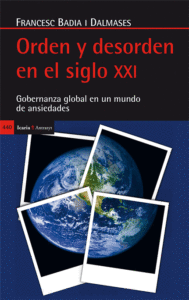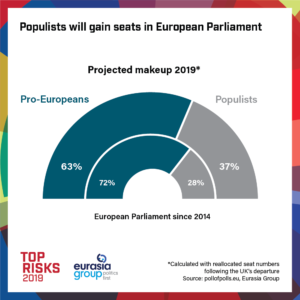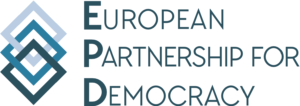 Democracy is facing strong headwinds in 2019, according to Francesc Badia i Dalmases, Director of DemocraciaAbierta and author of “Order and disorder in the 21st century. Global governance in a world of anxieties“. Liberal democracy is weakening throughout the globe. The social and political consequences of the 2008 recession constitute a dire scenario for the deepening and strengthening of Western democracies, he writes for Open Democracy.
Democracy is facing strong headwinds in 2019, according to Francesc Badia i Dalmases, Director of DemocraciaAbierta and author of “Order and disorder in the 21st century. Global governance in a world of anxieties“. Liberal democracy is weakening throughout the globe. The social and political consequences of the 2008 recession constitute a dire scenario for the deepening and strengthening of Western democracies, he writes for Open Democracy.
But it’s not all bad news.
“Although the European elections in May will see a significant increase in the presence of populists and nationalists in the European Parliament, especially of the emerging far right spectrum, the centrist bloc will continue to constitute the majority of the chamber and will surely work to strengthen European citizenship and ensure peace and (some) prosperity,” he suggests.

Eurasia Group
The global democratic regression only enhances the urgency of advancing democracy, but the European Union’s approach is overly “technical and depoliticized,” a new analysis claims.
‘[W]hile the concept of liberal democracy assistance may seem political in nature, meaning that pursuing liberal democracy abroad seeks to challenge the status quo, in reality this is done through less confrontational methods and priority is given to stable, technical and depoliticized solutions,” according to a report on the state of play of EU democracy assistance written by Nathan Vandeputte and Laura Luciani, researchers at Ghent University’s Centre for EU Studies.
 The EU seeks to promote in terms of three interconnected dimensions, they observe:
The EU seeks to promote in terms of three interconnected dimensions, they observe:
(a) conceptual – underlying models informing democracy assistance, or how the EU thinks about assisting democracy;
(b) discursive— frames used by democracy promoters, or how the EU talks about assisting democracy; and
(c) implementation— emphasis of priorities pursued by actors, or how the EU does democracy assistance.
“The EU has cautiously broadened the political scope of its democratic discourse,” the authors note, but “in reality …. this narrative has remained technical, depoliticized and uncontroversial.”
 The EU “thinks of democracy assistance in a process-oriented manner,” adds the report from the European Partnership for Democracy. “Democracy as such is to be developed in stages, primarily through addressing socio-economic and developmental objectives. This approach echoes the EU’s own experience with social and economic post World-War integration.” RTWT
The EU “thinks of democracy assistance in a process-oriented manner,” adds the report from the European Partnership for Democracy. “Democracy as such is to be developed in stages, primarily through addressing socio-economic and developmental objectives. This approach echoes the EU’s own experience with social and economic post World-War integration.” RTWT
 Given the authoritarian and populist resurgence, established democracies should pool resources and develop a strategic response through a league of democracies or a similar cooperative network, two leading analysts contend.
Given the authoritarian and populist resurgence, established democracies should pool resources and develop a strategic response through a league of democracies or a similar cooperative network, two leading analysts contend.
The United States has European allies and Asian allies, but no institution links the Asian and European democracies, say Antony J. Blinken and Robert Kagan. As China’s Belt and Road initiative draws Asia, Europe and the Middle East closer together in ways that serve Beijing’s interests, the democracies also need a global perspective — and new institutions to forge a common strategic, economic and political vision, they write for The Washington Post.
“Why shouldn’t Germany and France work with India and Japan on strategic issues? Such an organization — call it a league of democracies or a democratic cooperative network — would not just address military security but also cybersecurity and other threats that democracies face today, from terrorism to election interference.”







